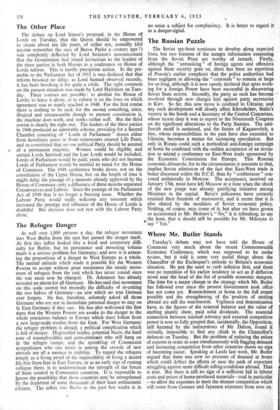The Other Place
The debate on Lord Simon's proposal, in the House of Lords on Tuesday, that the Queen should be empowered to create about ten life peers, of either sex, annually (did anyone remember the case of Baron Parke a century ago ?) was completely deflected by Lord Swinton's announcement that the Government had issued invitations to the leaders of the three parties in both Houses to a conference on House of Lords reform. This is hardly precipitate action. In the pre- amble to the Parliament Act of 1911 it was declared that that reform brooked no delay; as Lord Samuel observed recently, it has been brooking it for quite a while. The right comment on the present situation was made by Lord- Hailsham on Tues- day. Three courses are possible: to abolish the House of Lords; to leave it alone; or to reform it on the lines on which agreement was so nearly reached in 1948. For the first course there is nothing to be said; for the second something, since, illogical and unreasonable though its present constitution is, the machine does work, and works rather well. But the third course is clearly the right one. The leaders of the three parties in 1948 produced an admirable scheme, providing for a Second Chamber consisting of " Lords of Parliament " drawn either from hereditary peers or from commoners created Life Peers, and so constituted that no one political Party should be assured of a permanent majority. Women would be eligible, and certain Lords Spiritual and the Law Lords would be included; Lords of Parliament would be paid; peers who did not become Lords of Parliament would be entitled to stand for the House of Commons. The 1948 conference broke down, not on the constitution of the Upper House, but on the length of time it might delay the passage of a measure already approved by the House of Commons; only a difference of three months separated Conservatives and Labour. Since the passage of the Parliament Act of 1949 that is no longer a burning issue. Whether the Labour Party would really welcome any measure which increased the prestige and influence of the House of Lords is doubtful. But decision does not rest with the Labour Party alone.


































 Previous page
Previous page